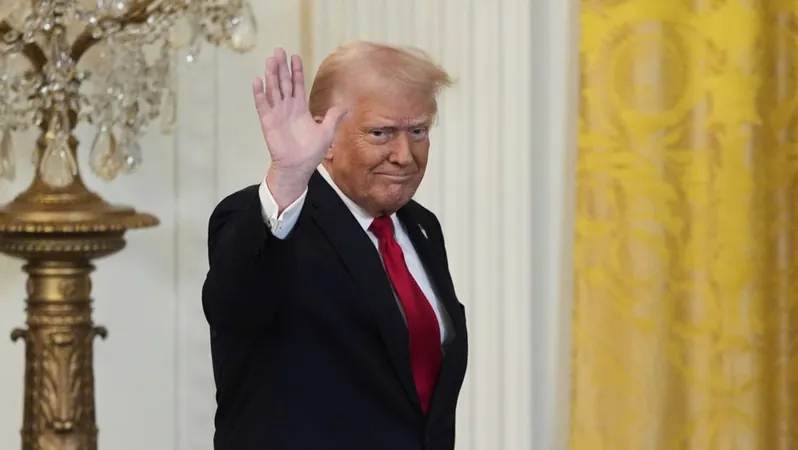
Trump's Aggressive Move: New Car Tariffs Potentially Spark Economic Turmoil
2025-03-27
Author: Siti
Trump's Aggressive Move: New Car Tariffs Potentially Spark Economic Turmoil
In a bold continuation of his trade agenda, US President Donald Trump announced on March 26 plans to impose hefty tariffs of up to 25% on automotive imports, amplifying the ongoing trade tensions with countries around the globe.
At a recent Oval Office event, Trump declared, "What we're going to be doing is a 25% tariff for all cars that are not made in the United States," highlighting a significant shift from the current 2.5% rate. This new policy is set to go into effect on April 2, the same day Trump intends to unveil reciprocal tariffs aimed at countries contributing to the United States' substantial trade deficit.
Industry experts are sounding alarms, predicting that these tariffs could lead to increased prices for American consumers and complications in vehicle production processes. For context, in 2024, the US imported automotive products worth $474 billion, with passenger cars alone totaling $220 billion. Major suppliers include countries like Mexico, Japan, South Korea, Canada, and Germany—friendly nations that may face serious repercussions from this new directive.
The legal foundation for Trump's tariffs stems from a national security investigation initiated during his first term. The 2019 probe into auto imports concluded that they posed threats to US national security, a claim that has raised eyebrows among both domestic and international observers. Yet, until now, Trump had refrained from taking action.
Under the new guidelines, parts compliant with the US-Mexico-Canada Agreement will remain tariff-free, but the implications for the automotive industry raise concerns about costs. With anticipated price hikes of thousands of dollars for consumers, analysts warn that such disruptions could stifle new vehicle sales and lead to job cuts in an industry heavily reliant on imports.
The impact of the announcement was immediate. Stock prices for US automakers dipped as investors reacted to the potential shocks from the tariffs. The S&P 500 Index finished down 1.1%, representing one of its worst performances in nearly a year.
Critically, Trump's stance on tariffs has been inconsistent. He has previously threatened tariffs on goods from Canada and Mexico, blaming them for the opioid crisis and also imposed substantial duties on steel and aluminum imports. As for the upcoming announcement on April 2, there remains uncertainty over whether the reciprocal tariffs are likely to provide the relief he has implied, as Trump promised a more lenient approach saying, "It'll be, in many cases, less than the tariff they've been charging for decades."
Amidst these developments, Jennifer Safavian, President and CEO of Autos Drive America, emphasized the burdens such tariffs will place on consumers, ultimately predicting a decline in manufacturing jobs and options available to American car buyers.
Comments from industry insiders, like Vivek Vaidya from Frost & Sullivan, reveal the precarious position of foreign automakers who depend heavily on the US market for profitability. “These companies cannot ignore the US market,” he stated, warning that the tariffs could disrupt established supply chains and lead to production delays that consumers will surely feel.
While Trump views tariffs as a necessary tool to revitalize American manufacturing and offset tax cuts, the broader implications of his trade policies could ripple through the economy, affecting not just automakers but consumers and the entire automotive supply chain. With mounting uncertainties, the automotive world watches closely as April unfolds, waiting to see how these tariffs will shape the future of car buying and manufacturing in America.
 Brasil (PT)
Brasil (PT)
 Canada (EN)
Canada (EN)
 Chile (ES)
Chile (ES)
 Česko (CS)
Česko (CS)
 대한민국 (KO)
대한민국 (KO)
 España (ES)
España (ES)
 France (FR)
France (FR)
 Hong Kong (EN)
Hong Kong (EN)
 Italia (IT)
Italia (IT)
 日本 (JA)
日本 (JA)
 Magyarország (HU)
Magyarország (HU)
 Norge (NO)
Norge (NO)
 Polska (PL)
Polska (PL)
 Schweiz (DE)
Schweiz (DE)
 Singapore (EN)
Singapore (EN)
 Sverige (SV)
Sverige (SV)
 Suomi (FI)
Suomi (FI)
 Türkiye (TR)
Türkiye (TR)
 الإمارات العربية المتحدة (AR)
الإمارات العربية المتحدة (AR)